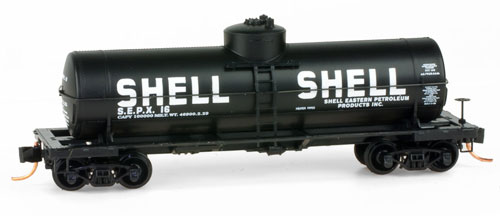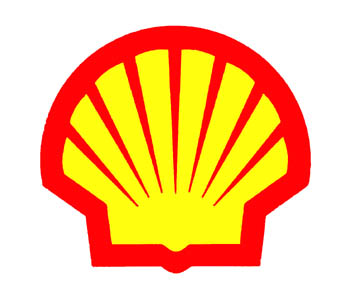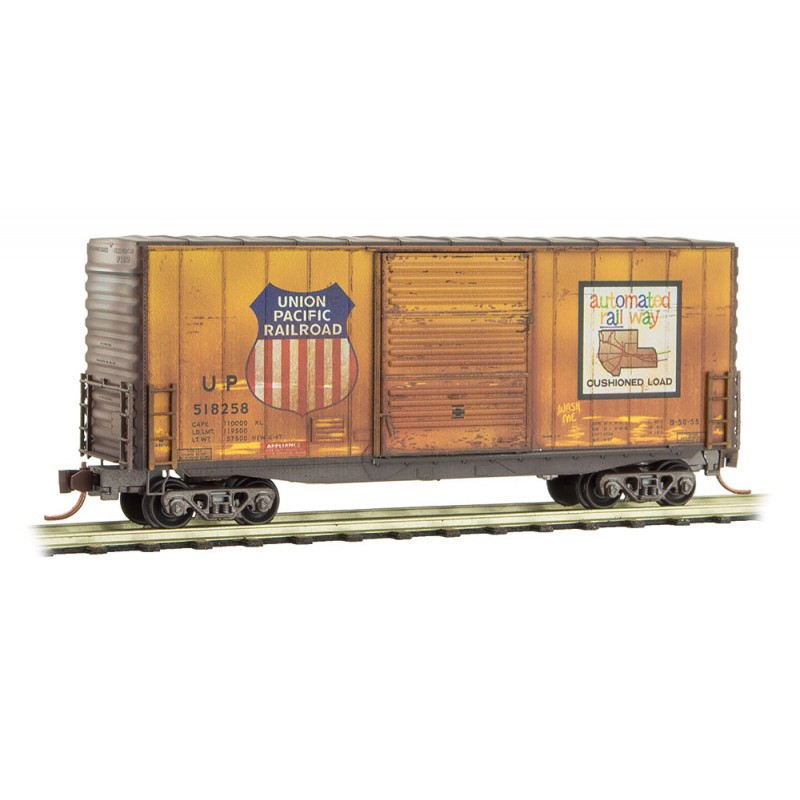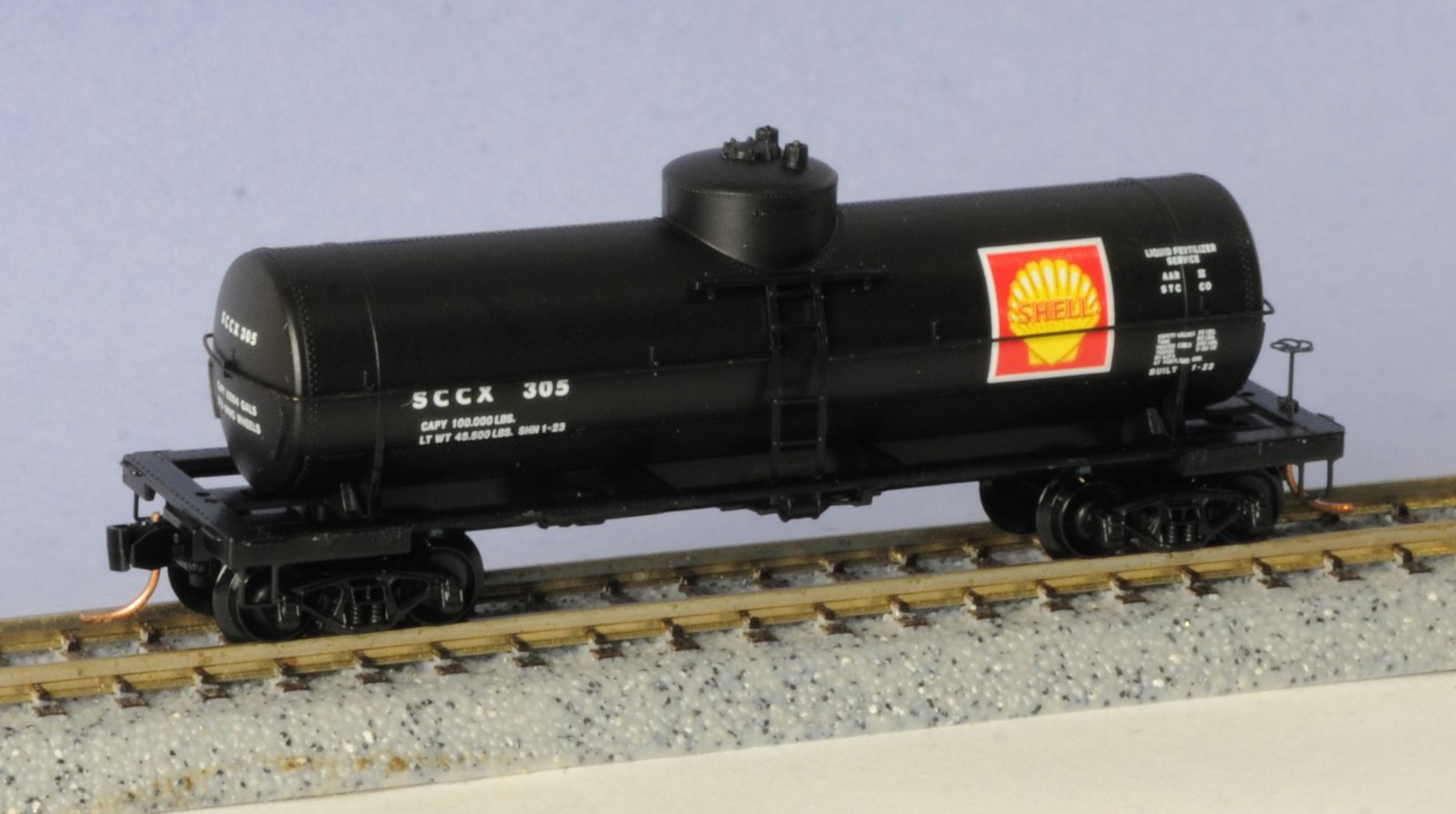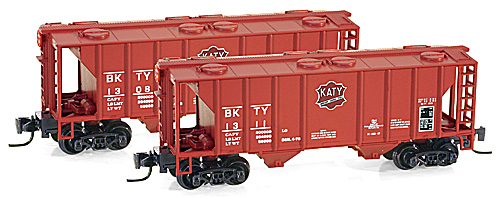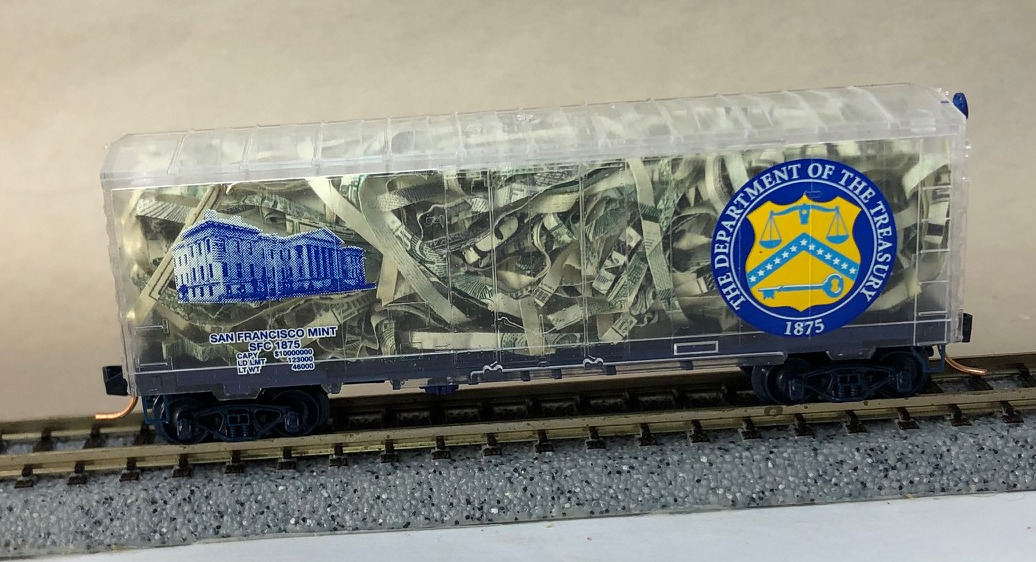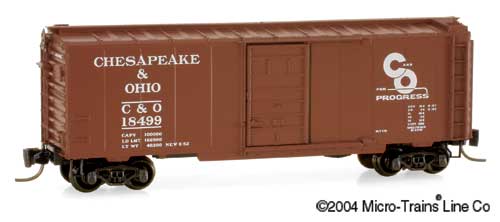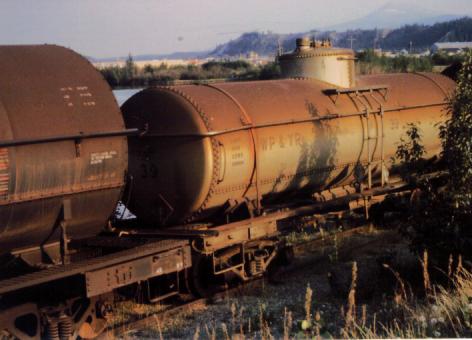Specific Item Information: This 39’ single dome tank car is painted black with white lettering. This interior-coiled tank car had a 10,153 gallon capacity and ran on 50-ton trucks. Rd# SEPX 16 was one of 15 ordered on Lot #831 built in 1929 at the Milton Manufacturing Plant.
Model Information: Dating back to 1979, this is the oldest and most popular of Micro-Trains tank cars. Over 200 different regular issues of this body style have been produced as well as hundreds more special runs, including the 2016 N Scale Enthusiast banquet car.
This car models tank cars of approximately 8,000 gallons. The prototypes were built in the 1950's and appeared on freight railroads across the United States and Canada.
This car models tank cars of approximately 8,000 gallons. The prototypes were built in the 1950's and appeared on freight railroads across the United States and Canada.
Prototype History: Single Dome tank cars are a railroad staple. They have been around since the first half of the 20th century. This length car can handle about 10,000 gallons. These railcars carry a wide array of commodities, including liquid fertilizers, chemicals, fuel oils and asphalt, and food-grade oils. Tank cars can be pressurized or non-pressurized, insulated or non-insulated. Single dome cars carry only a single commodity at once. Food-service tank cars may be lined with stainless steel, glass, or plastic. Tank cars carrying dangerous goods are generally made of different types of steel, depending on the intended cargo and operating pressure. They may also be lined with rubber or coated with specialized coatings for tank protection or product purity purpose. The tank heads are also stronger to prevent ruptures during accidents.
One common version is the ACF Type 27 jacketed tank car with expansion dome which was in common use by many railroads and oil companies.
One common version is the ACF Type 27 jacketed tank car with expansion dome which was in common use by many railroads and oil companies.
Road Name History: Shell Oil Company is the United States-based subsidiary of Royal Dutch Shell, a multinational "oil major" of Anglo-Dutch origins, which is amongst the largest oil companies in the world. Approximately 22,000 Shell employees are based in the U.S. The U.S. head office is in Houston, Texas. Shell Oil Company, including its consolidated companies and its share in equity companies, is one of America's largest oil and natural gas producers, natural gas marketers, gasoline marketers and petrochemical manufacturers.
Shell is the market leader through approximately 25,000 Shell-branded gas stations in the U.S. which also serve as Shell's most visible public presence. Shell Oil Company is a 50/50 partner with the Saudi Arabian government-owned oil company Saudi Aramco in Motiva Enterprises, a refining and marketing joint venture which owns and operates three oil refineries on the Gulf Coast of the United States. The Shell Oil Company Warehouse, built in 1925 and located at 425 S. N. 16th Ave. Phoenix, Arizona. It is listed in the National Register of Historic Places.
Shell products include oils, fuels, and card services as well as exploration, production, and refining of petroleum products. The Shell Oil Refinery in Martinez, California, the first Shell refinery in the United States, supplies Shell and Texaco stations in the West and Midwest.
In 1997, Shell and Texaco entered into two refining/marketing joint ventures. One combined their Midwestern and Western operations and was known as Equilon. The other, known as Motiva, combined the Eastern and Gulf Coast operations of Shell Oil and Star Enterprise, itself a joint venture between Saudi Aramco and Texaco.[6] After Texaco merged with Chevron in 2001, Shell purchased Texaco's shares in the joint ventures. In 2002, Shell began converting these Texaco stations to the Shell brand, a process that was to be completed by June 2004 and was called "the largest retail re-branding initiative in American business history."
Shell is the market leader through approximately 25,000 Shell-branded gas stations in the U.S. which also serve as Shell's most visible public presence. Shell Oil Company is a 50/50 partner with the Saudi Arabian government-owned oil company Saudi Aramco in Motiva Enterprises, a refining and marketing joint venture which owns and operates three oil refineries on the Gulf Coast of the United States. The Shell Oil Company Warehouse, built in 1925 and located at 425 S. N. 16th Ave. Phoenix, Arizona. It is listed in the National Register of Historic Places.
Shell products include oils, fuels, and card services as well as exploration, production, and refining of petroleum products. The Shell Oil Refinery in Martinez, California, the first Shell refinery in the United States, supplies Shell and Texaco stations in the West and Midwest.
In 1997, Shell and Texaco entered into two refining/marketing joint ventures. One combined their Midwestern and Western operations and was known as Equilon. The other, known as Motiva, combined the Eastern and Gulf Coast operations of Shell Oil and Star Enterprise, itself a joint venture between Saudi Aramco and Texaco.[6] After Texaco merged with Chevron in 2001, Shell purchased Texaco's shares in the joint ventures. In 2002, Shell began converting these Texaco stations to the Shell brand, a process that was to be completed by June 2004 and was called "the largest retail re-branding initiative in American business history."
Brand/Importer Information: Micro-Trains is the brand name used by both Kadee Quality Products and Micro-Trains Line. For a history of the relationship between the brand and the two companies, please consult our Micro-Trains Collector's Guide.
Manufacturer Information:  Micro-Trains Line split off from Kadee Quality Products in 1990. Kadee Quality Products originally got involved in N-Scale by producing a scaled-down version of their successful HO Magne-Matic knuckle coupler system. This coupler was superior to the ubiquitous 'Rapido' style coupler due to two primary factors: superior realistic appearance and the ability to automatically uncouple when stopped over a magnet embedded in a section of track. The success of these couplers in N-Scale quickly translated to the production of trucks, wheels and in 1972 a release of ready-to-run box cars.
Micro-Trains Line split off from Kadee Quality Products in 1990. Kadee Quality Products originally got involved in N-Scale by producing a scaled-down version of their successful HO Magne-Matic knuckle coupler system. This coupler was superior to the ubiquitous 'Rapido' style coupler due to two primary factors: superior realistic appearance and the ability to automatically uncouple when stopped over a magnet embedded in a section of track. The success of these couplers in N-Scale quickly translated to the production of trucks, wheels and in 1972 a release of ready-to-run box cars.
Micro-Trains Line Co. split off from Kadee in 1990 to form a completely independent company. For this reason, products from this company can appear with labels from both enterprises. Due to the nature of production idiosyncrasies and various random factors, the rolling stock from Micro-Trains can have all sorts of interesting variations in both their packaging as well as the products themselves. When acquiring an MTL product it is very important to understand these important production variations that can greatly enhance (or decrease) the value of your purchase.
Please consult our Micro-Trains Collector's Guide

Micro-Trains Line Co. split off from Kadee in 1990 to form a completely independent company. For this reason, products from this company can appear with labels from both enterprises. Due to the nature of production idiosyncrasies and various random factors, the rolling stock from Micro-Trains can have all sorts of interesting variations in both their packaging as well as the products themselves. When acquiring an MTL product it is very important to understand these important production variations that can greatly enhance (or decrease) the value of your purchase.
Please consult our Micro-Trains Collector's Guide
Item created by: Lethe on 2015-05-31 17:46:30. Last edited by gdm on 2020-06-12 13:11:50
If you see errors or missing data in this entry, please feel free to log in and edit it. Anyone with a Gmail account can log in instantly.
If you see errors or missing data in this entry, please feel free to log in and edit it. Anyone with a Gmail account can log in instantly.


